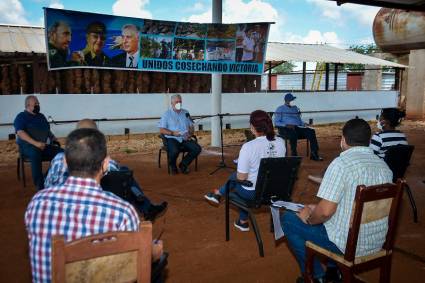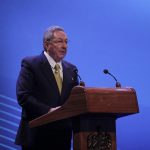Mayabeque, Cuba: The First Secretary of the Communist Party of Cuba began and sealed the work week as he likes best: interacting (communicating and learning) with his fellow citizens. On Saturday morning he marched inland to meet with agricultural producers from Mayabeque and Artemisa, the digital version of the Juventud Rebelde newspaper publishes.
He went under a roofed space next to one of the “scrubbing” machines of the Rinconada No.2 farm of the Güines agricultural company. In the previous days he had already been with economists, with young people, with religious, as part of a sequence of affable, respectful, but sincere and without half measures, dialogues that involve representatives of the different sectors of Cuban society and who are going to continue.
The President of the Republic, Miguel Díaz-Canel Bermúdez, arrived at the farm accompanied by the Prime Minister, Manuel Marrero Cruz, on an embankment that miraculously woke up in the air despite the rains of the last afternoons in the region.
The Vice President, Salvador Valdés Mesa, and the Vice Prime Minister and Head of Economy and Planning, Alejandro Gil Fernández, were waiting for him there, and where having a pleasant “technical” conversation with the Minister of Agriculture, Ydael Pérez Brito, the Party’s first secretary in Mayabeque, Yanina de la Nuez Aclich, and the governor, Tamara Valido Benítez.
The President met again, “live”, with the producers in the passing of a difficult semester —and more—, in which the country’s farmers manifested many disagreements with the monetary and exchange regulations initiated on the 1st. January (the Ordering Task).
Extremely stressed by the lack of resources to acquire and supply them with inputs, raw materials and other goods due to the intensification of the blockade, the COVID-19 pandemic and the global economic crisis that it has brought about, the situation was fully assumed by the Government , and to solve it.
At the request of the President of the Republic, who more than once has had to “hit hard” on the table, the executive has been giving answers to the just demands of the producers, until finally completing a “package” of 63 measures that have given a positive turn to the state of mind and the national agricultural reality.
Without making an effort of optimism, a not very seasoned observer and even connoisseurs too, could even say that Cuban agriculture is totally different today, that it has almost changed 180 degrees, and for the better, although there is still much to be done in terms of regulations and in the reality.
What has been said so far did not make it strange, then, that Diaz-Canel began the dialogue with the peasants by asking their opinion on this whole process, how has it favored them? What can be improved? What proposals do they have to make about agrarian and livestock issues? And, above all: what disposition do we have to continue improving food production and to be able to better satisfy the needs of the population?
“It is true that we have the blockade, and it affects us a lot, especially in a sector like this,” he said, but the blockade will continue, the question is then – he added later – in “in which extent we are capable of producing the food that the people need to have to import less.
The question is – he added – in “going over the blockade and showing that we can develop a sustainable, efficient agriculture; that we can produce an important part of the food demanded by the population, and that this also becomes a better standard of living for farmers based on the income they obtain from what they produce.
«What we ask of you once more – he pointed out – is that in the midst of the so complex situation that we have, in which a part of the population has a certain vulnerability, especially pensioners and retirees, that to the extent that they can promote prices that are more affordable to the population, without you affecting your income, do so.
However, he said praising the solidarity of the peasantry, we know of the willingness with which they have supported the isolation centers for the
COVID-19, hospitals, social institutions; we know that with the authorization for the slaughter of cattle, many have donated the first animal.
We want to talk about all this”, Díaz-Canel reiterated, “and that you propose us what other things may still be lacking, and to do so with all the confidence, we have come here to seek from you, in addition to support in this task, to raise the productive levels, that tell us what other obstacles exist and must be removed, what other limitations can be eliminated.
Words from the ground
Several producers and presidents of cooperatives, such as the CPA Amistad Cuba-México, from Alquízar, Artemisa, of various crops; and the CCS Noelio Capote, from Jaruco, Mayabeque, dedicated to livestock, highlighted the positive effects of the measures adopted by the country to boost the agricultural sector and stimulate producers, including the authorization for the slaughter of larger cattle.
In Jaruco people are happy, now we sell milk in the popular council and beef, and the producer is satisfied to be able to sacrifice an animal when it complies with the established and eat a piece in the backyard of the house without any problem, Marques López said.
Carlos Fernando comments that in his CPA the results are visible; they have contributed 400 tons of food above the plan. “Producing as much as we can with the little we have is key to alleviating the country, at least in terms of food.”
Abelardo Álvarez, president of the CCS Antonio Regalado, from Güira de Melena, Artemisa, agrees with his colleagues. This state of mind that is now prevailing in the Cuban countryside is the result of the decision of the Party, the Government and the Ministry of Agriculture to listen to the peasants, he reflects. However, he is critical of a certain egalitarianism that takes place in the distribution of resources.
“Resources”, he says, “are limited and must be used. It is necessary to deliver them to the producers who have the best results, we cannot afford to give them to those who do not take care of them. It is true that we must attend to everyone, but it is also true that we have to prioritize the best”.
Jesús Lazo, from CCS March 13, is one of the most successful beneficial owners in the country, but he regrets the setbacks he has had to face for the sale in foreign currency, starting because to obtain the card in the corresponding MLC, the bank required him to deposit an amount in cash.
The harvest has to go on
Díaz-Canel took note of each of the reflections and problems raised by the producers, which he reviewed aloud at the end of the meeting and asked if something was missing.
The First Secretary thanked the farmers for the confidence with which, despite the initial complaints, disagreements and contradictions with the Ordering Task, they assumed production at the beginning of the year. “You did not stop, you continued sowing, you trusted that there would be solutions and you were going to be listened to, and today an important part of what we are offering to the population this summer has to do with that attitude.
«If due to a group of misunderstandings you had not sown, developed the plantations, harvested, today we would have a much more complex situation in the food area, and without everything being resolved yet, we observe that you begin to see a slight increase in the distribution of products”.
The President of the Republic acknowledged the depth with which the producers raised the dissatisfactions and the solutions that they proposed then, “which was what allowed us to rectify a group of elements of the Regulation”, and arrive at the measures adopted months later for the sector.
Now one sees that you share these measures, but in reality you, the Government, the State created them. What they did was make the concerns viable. These decisions – he affirmed – are the result of a democratic exercise. “We only went to those who know, who are the ones who produce.”
“You, he added, told us what the obstacles were, what the problems were, what had to be solved, and they were listened to and the governance looked for ways to find solutions to those problems, and today we have a package of measures —whether the whatever number -, with robustness, which is shared by you, which are appreciated by you, because it was built from dialogue, from consensus building.
Finally, Díaz-Canel told them: “You are who know how to produce, and we will continue to systematize these types of meetings.”

Redacción Digital
Equipo de redactores del sitio web de Radio Mayabeque



